Until now we knew that excessive salt intake could lead to cardiovascular problems and other problems related to blood pressure. In fact, it is the first thing that the family doctor or cardiologist removes from a diet for people who have suffered strokes or heart attacks. What we did not know is that adding too much salt to our meals can have very negative consequences for the brain, especially in sedentary people who do not do any type of exercise or physical activity.
Dementia: the relationship between salt and the brain
This condiment so widely used in our kitchen has an impact on the cellular level and affects cognitive function. The key is found in the intestine. These conclusions are drawn from a study carried out in New York on mice, which were administered a high-salt diet for several weeks. During this time it was observed that the rodents developed dementia, even when their blood pressure did not increase. This conclusion overturns part of the theories that were known up to now and that suggested that one of the deleterious effects of salt on cognition was due to hypertension.
Mice were fed food containing either 4% or 8% salt, representing an 8- to 16-fold increase in salt compared to a normal mouse diet. The rodents showed marked reductions in resting cerebral blood flow in two brain areas involved in learning and memory: a 28% decrease in the cortex and a 25% decrease in the hippocampus. But there is no need to be alarmed because the study affirms that this effect is reversible. After a few days, some mice were put back on a regular diet and everything was found to return to normal.
Why reduce salt in our diet and how to do it
It is important to reduce the consumption of salt in our menus to avoid not only the aforementioned diseases, but also others such as kidney failure, stomach cancer, osteoporosis or fluid retention. How to carry out this process? Here are some tips:
- Try to reduce the intake of fatty foods such as cured cheeses, snacks, artificial or prepared sauces.
- Join the fashion of using spices or aromatic herbs in your kitchen. They will give you a lot of flavor and do not add salt.
- Choose to roast the meat and vegetables or prepare them on the grill with a little oil.
- And if you team up with lemon to season white meats, chicken or fish?
- Another good option is stir-fry prepared with minced garlic, onion, or peppers.
- Flavored oils or vinegars and vinaigrettes will also help you not to miss the salt.

